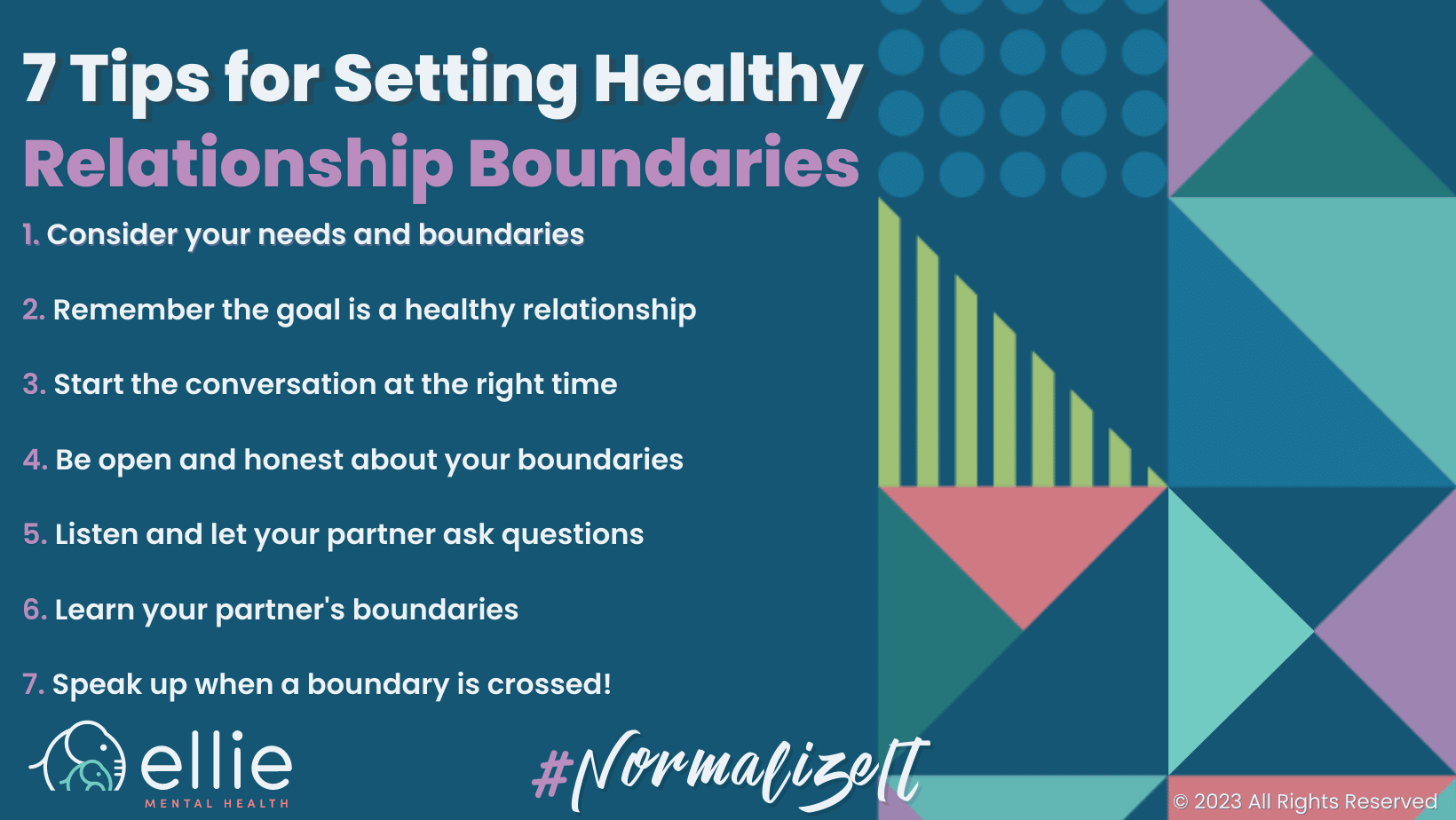When is setting boundaries in your relationship necessary? Why are they so important? And how do you set and maintain healthy boundaries?
If you’re new to setting boundaries, the act of putting up walls might sound like the opposite of a healthy, thriving relationship. After all, isn’t the goal of intimacy to become more vulnerable and encourage closeness in your relationship?
Now here’s a hot take we’d like you to take a moment to chew over: setting boundaries actually builds intimacy and strengthens your communication skills in the long run.
Sure, it might be clunky in the beginning, but taking time to understand your – and your partner’s – limits and needs paves the way for healthy connection, respect, fulfillment, and comfort. With the right boundaries in place, you can grow and deepen your bond in a way that facilitates trust and acceptance.
In this blog, we’ll explore what healthy boundary setting looks like, why you might have a hard time with setting boundaries, and how to establish boundaries with someone in your life.
Want support in building healthy relationships – without neglecting your own mental health in the process? Find an Ellie therapist near you to get started.
When Is Setting Boundaries in a Relationship Necessary?
Setting boundaries might not be something you think about until you feel you have been used, disrespected, or burned in a relationship. And while getting hurt in a relationship is a good indicator that you could benefit from some boundaries, ideally, you should always have an understanding of what your boundaries are and communicate those with your partner from the very start.
So rather than being reactive in dealing with relationship issues, consider how being proactive could benefit your own health and your relationships. When setting boundaries, we encourage you to look in – not out. Rather than looking at your partner and things they do that make you upset and going from there, consider your own values, needs, and reactions.
Why Should You Set Boundaries?
You can’t assume that you and your partner will always be on the same page on what your relationship should look like. And while social media, your parents, and your friends might have a lot of opinions on what a “normal” relationship should look like, the reality is that each relationship is unique.
For example, if you don’t communicate with your partner that it’s important for you to have some time alone for self-care or other activities you enjoy, you might feel frustrated if you can’t seem to get some time to yourself and pursue your goals. And your partner, on the other hand, might feel neglected or hurt if they feel you don’t want to spend time with them.
Clear communication is key. If you can express to your partner that you actually aren’t upset with them when you don’t text them back during your hour-long yoga sesh and that your health and wellness is a priority to you, then they can go about their day feeling reassured that you actually aren’t ignoring them.
It sounds simple, right? But expressing our needs – small or big – isn’t always easy, especially if you are unpracticed in saying no or have been put down or hurt for this type of expression in the past. And you might find half the challenge is in communicating these needs in a way that is assertive while not coming off as confrontational or hurtful.
Unsure if your communication is healthy? Check out examples of gaslighting in our blog.
How To Set Healthy Boundaries in Relationships

If you tend to run headfirst into relationships without setting boundaries, it can be difficult to know where to start. You might be anxious that your partner will misunderstand your reason for setting boundaries – and having these tough conversations can feel vulnerable and downright awkward. However, whether you 16 or 66, your mental health matters – and boundaries are a positive step toward making your well-being a priority.
If you’re not sure how to get started with setting boundaries, here are a few expert tips to get your started:
- Come Prepared: Before starting the conversation, take time to ponder over what your boundaries are. Consider your values and your needs. Boundaries can cover a wide range of topics, such as time, texting and communication, sex and intimacy, emotions, and finances.
- Remember the Goal: Boundaries are not a punishment or way to control or manipulate someone. Rather, boundaries exist to facilitate a relationship built on mutual understanding and healthy attachment.
- Choose an Appropriate Time: Bringing up boundaries right after a big argument might not be the best time to start the convo. Make sure your partner is open and attentive and understands this is an important conversation to have.
- Be Open and Honest: You don’t need to be ashamed of your boundaries. You are not needy or high maintenance for having them. Be honest about your boundaries, even when it comes to uncomfortable topics.
- Listen to Your Partner: Your partner might have some pushback or reservations about your boundaries. They might have questions on why you’re setting them in the same place. Did they do something wrong? Are you trying to push them away? Take time to answer their questions and explain the whys, hows, and whats.
- Learn Your Partner’s Boundaries: Learn if your partner is open and ready to discuss their own boundaries. It’s important you know how to respect and value your partner’s needs as well. If they’re not sure where to start, you can ask some questions such as “what does healthy communication look like to you?” “What are you comfortable with in this situation?” “What do you need to stay physically and emotionally healthy?”
Speak Up When Boundaries Are Crossed
Setting boundaries is only half the challenge. Maintaining boundaries can be more challenging than you might realize, and it’s not unlikely that a boundary might get crossed.
Maintaining boundaries is a two-way street. On one hand, your partner needs to respect the boundaries you have both discussed. However, you need to stand firm in the boundaries you set for yourself and speak up if it’s been crossed.
Boundaries aren’t just for your partner – they’re also to keep yourself in check. For instance, you might set a boundary to maintain your time and health. While it might be tempting to put all your energy and time into your partner, you need to remind yourself why you set the boundary in the first place.
And if you’re boundaries are consistently being crossed – despite being clearly communicated – this can put your relationship at risk. This is a sign your partner does not prioritize your needs.
Get Support in Building Thriving, Healthy Relationships
What does a healthy relationship actually look like? We see examples from parents, other couples, books, and TV, and the reality is it’s so hard to know what a real thriving relationship looks like. Setting boundaries might not feel like a scene from the Titanic, but trust us when we say this is the real good stuff. To feel validated, accepted, and respected is the foundation of love and companionship – and you should never settle for less.
We know that relationships are so so hard. Couples counseling can support you in setting boundaries and building a healthy relationship that doesn’t compromise your health and well-being in the long run.
Seeking individual or couples therapy near you? Find a therapist you can vibe with at Ellie Mental Health.


